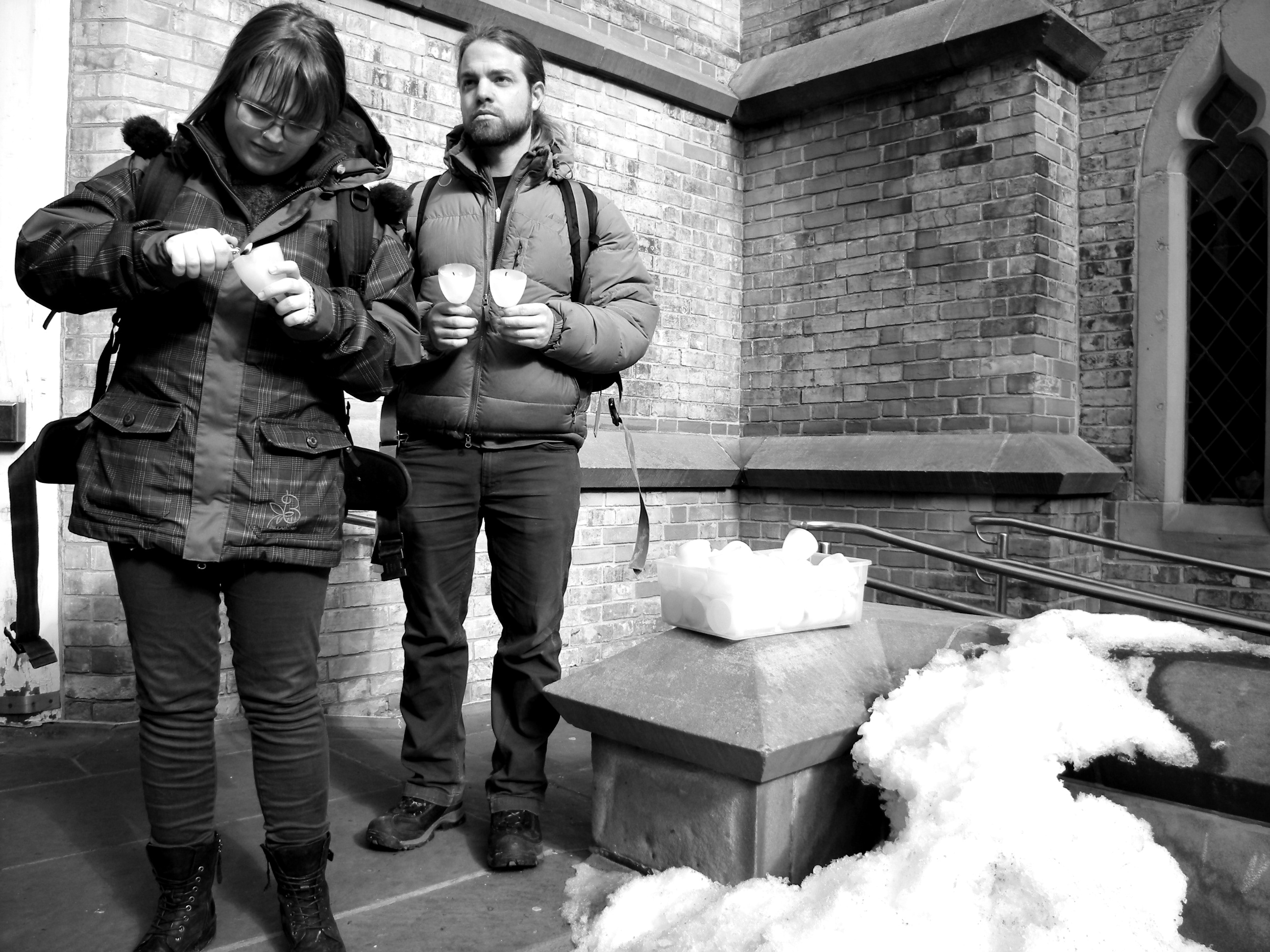Seven hundred names.
On the Homeless Memorial board outside the Church of the Holy Trinity.
Seven hundred names.
Men, women and children who’ve died as a direct result of homelessness since the 1980’s.
Seven hundred names.
People who died far sooner than the norm.
Seven hundred names.
Those who lived on the streets, in ravines, in shelters, on friend’s couches, in stairwells, over subway grates, in alleys or in their cars.
Seven hundred names.
Too many John and Jane Does. Too many physical and sexual abuse survivors. Too many First Nations peoples. Too many psychiatric survivors.
Seven hundred names.
Died from an overdose. Or suicide. Murdered. Burned to death. From diseases normally seen in much older people.
Seven hundred names.
Forgotten by most. Remembered by a few.
While 60 mourners remembered seven homeless people who lost their lives (one last year, four in January and two in February) at the monthly homeless memorial vigil in Toronto on Tuesday, federal politicians prepared to debate Bill C-400, a bill to create a national housing strategy in Canada.
Debate will begin on Wednesday followed by a free vote near the end of the month. A free vote means MPs will be allowed to vote their conscience rather than being tied to a formal party line.
“Which means members can actually vote for the right thing instead of just what their party boss tells them to vote for,” said Michael Shapcott, Director, Affordable Housing and Social Innovation at the Wellesley Institute in Toronto.
“So we’re appealing to all members of parliament to support this legislation.”
Until an adequate supply of social housing becomes available, homeless people continue to rely solely on the shelter system for their survival.
But anti-poverty activists like John Clarke maintain that a severe crisis exists in the shelter system.
Chronic underfunding has led to several shelter closings in the downtown core. The loss of shelter beds has forced many homeless people to survive on the streets, taking a serious toll on their physical and mental well-being.
Yet the City claims there are enough beds for everyone.
“We are challenging the lie that the situation is being taken care of,” said Clarke, an organizer with the Ontario Coalition Against Poverty (OCAP).
“That there are enough beds. That there isn’t really a problem. That the shelter system is not in crisis.”
On Friday at 11 am, OCAP is holding a planning session at the Church of the Holy Trinity to talk about taking and setting up an emergency shelter.
“To do so in a visible and a powerful way,” said Clarke.
“Because if we ever arrive at a situation where the loss of human life to social abandonment on the streets of this city becomes normal or becomes something people don’t even notice, then we’re lost.”
Sixteen years ago, when Bonnie Briggs started the Homeless Memorial, she never dreamed that one day there would be 700 names on the board.
“And it should not be this high,” said Briggs. “And it should not go any higher.”
But sadly it will.
After the vigil, the group walked over to City Hall, stood around the rotunda on the second floor, lit their candles and observed a moment of silence, before attempting to deliver a list of all 700 names to Mayor Ford and demand action on the city’s shelter crisis.
The doors to his office were locked down.
“We’ve seen this before,” said Cathy Crowe, a street nurse and social activist, who’s come to the office of the Mayor many times with similar issues since the 1980’s.
Every night, frontline workers trying to find shelter beds for their clients are being told that there are no beds available.
“And then when the City talks to the media, they say there’s plenty of beds available,” said Doug Johnson, a street pastor with Sanctuary Ministries.
“Yet we were counting as many as 20 people per night sprawled out, sleeping in chairs at the referral centre.”
The rest choose to remain outdoors.
“Considering the shelters are full of TB and bed bugs and they’re not safe or clean, who would want to sleep in a place like that?” asked Briggs.
A few minutes later, George Christopoulos, the Mayor’s press secretary, came out to meet with the group. Christopoulos is a former communications coordinator for Toronto Police. Previously, he worked as a Toronto Sun reporter covering crime, general assignment news and City Hall.
“All of us are seriously dismayed at the City’s response to homelessness,” said Crowe.
“We want you to give this list of 700+ names of men, women and even some children who have died homeless in this city.”
Crowe told Christopoulos that the public health department doesn’t track homeless deaths.
“Only we are doing it,” she said.
“They are not counting. They are also not being honest about the number of shelter beds available. We’ve got dozens of people at the Peter Street site waiting for shelter beds. And we’d like to know what you’re going to do about it.
“Will you open an emergency shelter?”
No response from Christopoulos. But he takes the list from Crowe.
“So the issue is people are dying homeless, we don’t have enough shelter beds, Peter Street is overflowing with people and we need a City response this winter,” said Crowe.
“Other cities are trying to deal with this. The City of Toronto should be leading.”
“Do something,” said Briggs.
“Shame on the Mayor’s office,” said Crowe. “Shame on the Mayor.”
Christopoulos stood silent.




